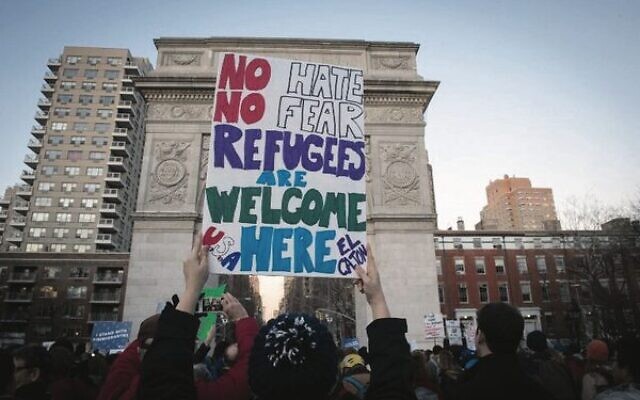Antisemitism masked by alliance with far left
The authors warned that over time, fringe antisemitic beliefs could become increasingly mainstreamed if these organisations are not challenged.

As antisemitic attacks continue to rise in the United States, a growing alliance with far-left organisations has shielded US Islamist groups from scrutiny of their antisemitic statements and ideas, a study by an Israeli think tank has warned.
“US Islamist groups and leaders have increasingly sought common cause with progressive left-wing groups that promote minority rights and intersectionality among racial, ethnic and religious minorities in their efforts to build coalitions around common interests,” charged Yehudit Barsky and Ehud Rosen, authors of the Institute for National Security Studies (INSS) report Islamist Antisemitism in the United States.
The “red–green” coalition is based on a narrative that portrays the Israeli–Palestinian conflict as an anti-colonial struggle, and US Muslims as victims of racism on par with other marginalised minorities in the US, said the INSS study.
The alliance also seeks to delegitimise Jewish communal organisations, according to Barsky and Rosen, by portraying them as part of a white power structure in the US that is ineligible for inclusion in progressive coalitions.
“Within these coalitions,” charged the study, “US Islamists have sought to boycott and delegitimise progressive Zionists and supporters of Israel, deeming them as oppressors and illegitimate participants.”
Barsky is a research fellow at the Institute for the Study of Global Antisemitism and Policy, and Rosen is a team member of the INSS’s project on Contemporary Antisemitism in the United States.
The study is the latest instalment in an ongoing INSS series on antisemitism in the US.
Leading Islamist organisations like American Muslims for Palestine and the Council on American Islamic Relations, the authors argued, seek to challenge the right of mainstream Jewish and pro-Israel organisations to define antisemitism and to call themselves civil rights organisations. A campaign against the Anti-Defamation League, the leading antisemitism watchdog, called it a “silencer of free speech” and promoter of Islamophobia, and pushed for other civil rights organisations to boycott it.
The authors warned that over time, fringe antisemitic beliefs could become increasingly mainstreamed if these organisations are not challenged.
A 75 per cent spike in antisemitic attacks in the US during and after the 2021 conflict in Gaza is evidence of the need to address Islamist antisemitism, and not only Jew-hatred on the far-right, said Barsky and Rosen. While that discourse exists in Europe, the successful rebranding of Islamist groups from extremists to champions of human rights has stymied debate over their activities against Jewish and pro-Israel organisations in the US.
The alarming trend of antisemitic attacks continued into 2022, according to the ADL, rising another 36 per cent over the previous year.
Several major incidents were perpetrated by Islamists last year. In January 2022, British Islamist Malik Faisal Akram took the rabbi and three worshippers hostage at Congregation Beth Israel in Colleyville, Texas, and demanded that an imprisoned al-Qaeda member be freed.
In November, the FBI issued a security alert to synagogues across New Jersey. The next week, a young Muslim man was arrested in New Jersey for distributing a manifesto online with threats to attack synagogues.
“The process of choosing allies from the Muslim community should be made much more carefully, and proper due diligence is required,” argued the report, which also noted that there is no evidence that Islamist groups represent the beliefs of most American Muslims.
“These developments call for increased vigilance and a robust response by the American Jewish community and its allies,” urged the authors.
TIMES OF ISRAEL

comments